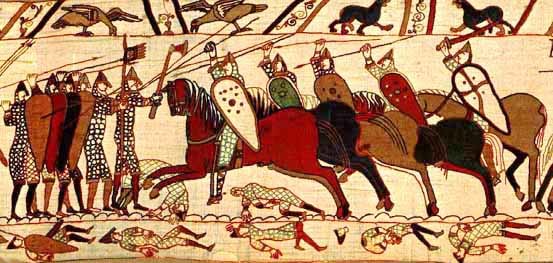Look at the following list of words that we use every day: Castle, vessel, apostle, forest, petit, etiquette, table, debt, doubt, mayor, restaurant, buffet, cafe, chandelier, chauffer, and the list goes on and on. All of these “English” words, and many more, are of French origin.
According to French Together, there are more than 100,000 words in the French dictionary, and as many as 29% of English words have French origins. That’s a lot of words. So why is that? Why do we have so many French words in the English language? Good question, right? I mean, if you’re like I used to be, then you might cringe every time you found yourself having to use one and ask yourself the same question … again. Unlike some questions, however, this one actually has a very reasonable answer. One day, quite by accident, I found that answer, and the story behind it is, I think, very interesting. See if you agree…
I subscribe to a couple of mailing lists that give daily suggestions of ebooks that are being offered for free or, if not for free then at a steep discount. Links to those sites are below, in case that might be useful to you. One day, I saw an ebook offered at Amazon for $1.99, and I thought it sounded interesting, so I bought it. And that’s were I learned the answer to my question. The name of the book was (is), The Norman Conquest: The Battle of Hastings and the Fall of Anglo-Saxon England, by Marc Morris. Here’s a brief synopsis of the parts of the book that go to the question:
The Norman Conquest
In 1066, French Duke William of Normandy crossed the English Channel with his army and, primarily at the Battle of Hastings, conquered what was then Anglo-Saxon controlled England. After gaining control, he brought over his own people to be placed in higher government positions, even including important positions within the church. He also granted to his fellow Normans great landholdings in their new country, in many cases supplanting the previous Anglo-Saxon owners.
A new nobility
The people that William imported became the new nobility of the land. And few of those new residents, if any, spoke English. So it came to be that the French language was the language of the new well-to-do class in England. William even had all English laws and other important legal documents written in French and/or Latin. So speaking French became a mark of the English upper crust, and, quite naturally, all of the not-quite-there upper-class wannabees sought to imitate those whom they so fervently admired and envied.
And that’s how, why, and when the English and French languages became sort of merged. So, while I consider myself more of a Saxon than a Norman, knowing the history behind that merger made me a bit more comfortable in using all of those “Frenglish” words that seem to creep into my speech once in a while. You know, like “faux” Republicans, a.k.a. RINOs.
So that’s the story, and I think it is an interesting one, but, of course, in web-speak, YMMV. There are other stories in the same vein, like how Normandy, while a part of France, sort of became its own kingdom, with Duke William as its leader, including how it came to be named Normandy, and how, long before that, the Anglo-Saxon people had come to dominate England (i.e. Angland), but those are for another day.
Ebook mailing lists:
I’m sure that there are others, but these are the ones that I use.
Jere Moore has been blogging about political matters since 2008. His posts include commentary about current news items, conservative opinion pieces, satirical articles, stories that illustrate conservative principles, and posts about history, rights, and economics.
